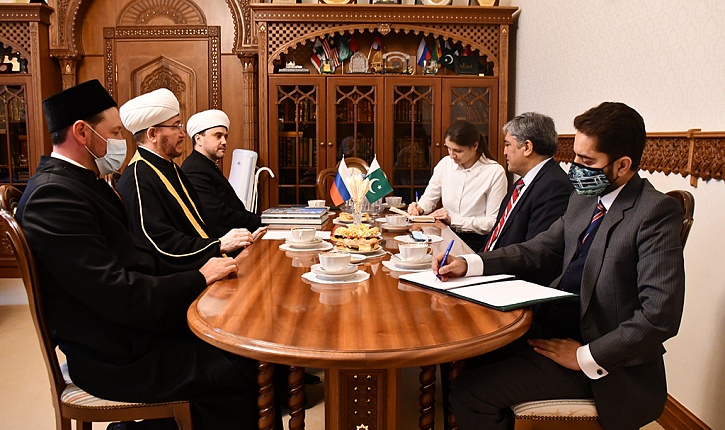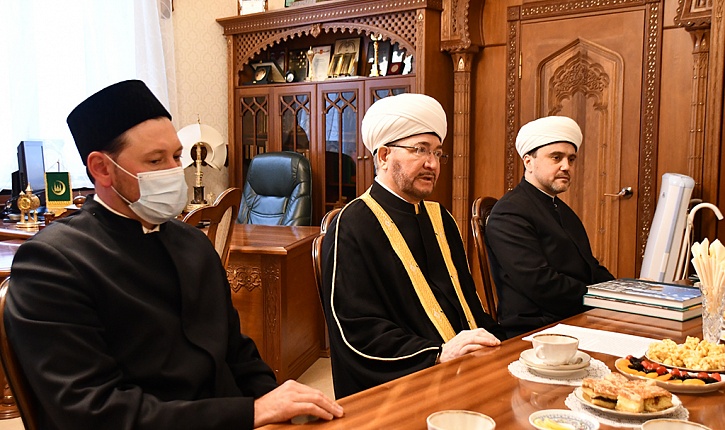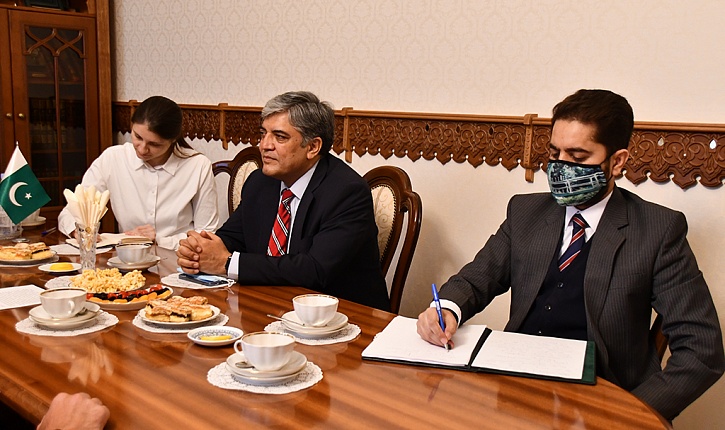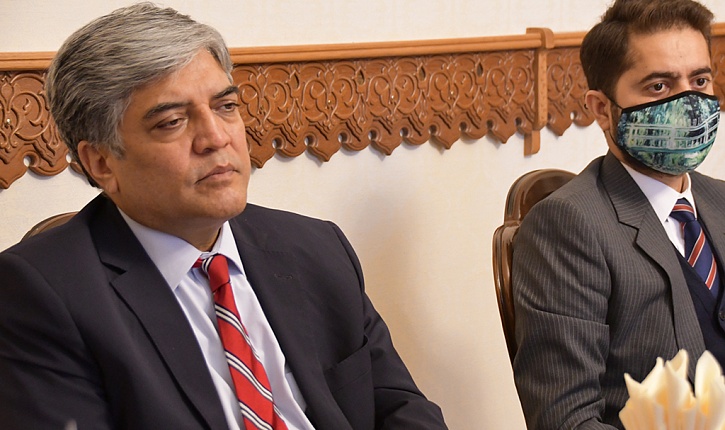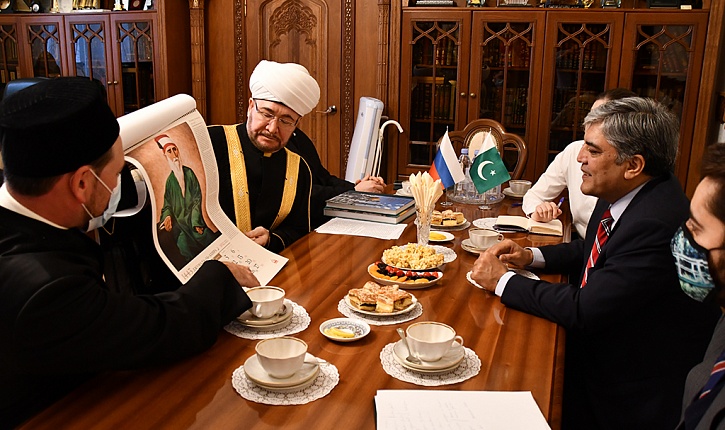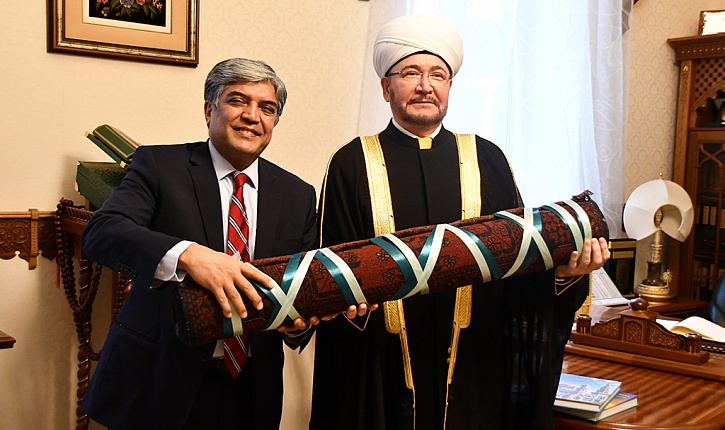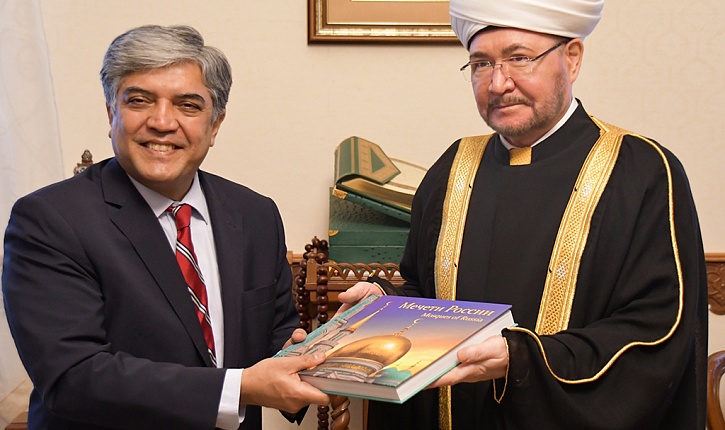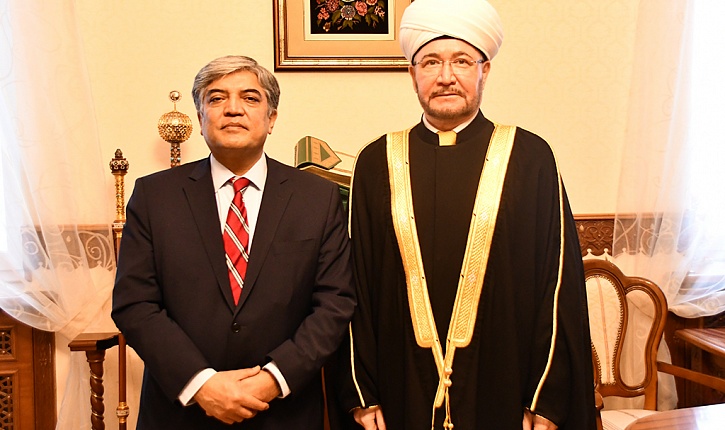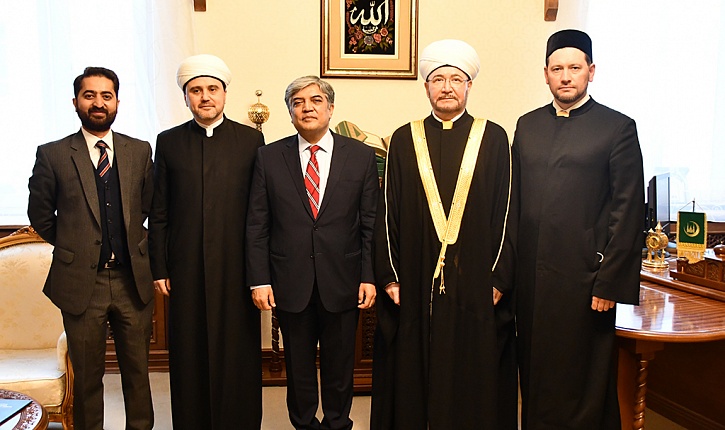Ambassador of Pakistan Shafqat Ali Khan: Russia is a factor of stability in the international arena
On 17th of February, the General Secretary of the Muslim International Forum, Chairman of the RBM RF of the Russian Federation Mufti Sheikh Ravil Gaynutdin met with Ambassador Extraordinary and Plenipotentiary of the Islamic Republic of Pakistan Shafqat Ali Khan. The exchange of views took place within the framework of strengthening interstate relations and people's diplomacy between the Russian Federation and the Islamic Republic of Pakistan.
Opening the meeting, the religious leader of Russian Muslims stressed that the spiritual ties of Russian Muslims with their co-religionists in Pakistan date back more than one century. The first major line connecting the Russian and Hindustani Islamic traditions is the figure of Sheikh Ahmad Sirhindi Rabbani (1563-1624) – the "renovator" of the naqshbandiyya tariqa and the originator of its branch naqshbandiyya mujadidiyya. This branch has found the widest distribution among Muslims of the Volga region and the Urals. The second line already refers to the new time and is expressed in the intellectual interrelations of Muslims of Russia and Indo-Pakistan based on the ideas of renovation.
Currently, Russian Muslims are studying and popularizing the works of Muslim scholars of Hindustani origin, the most striking example of which is the publication in the publishing house "Medina" of the Russian translation of the interpretation of the meanings of the Noble Quran by Abdullah Yusuf Ali (1872-1953). In the twentieth century, this theological work played a major role in introducing the world's English-speaking reader to the religion of Islam and its holy scriptures, bringing a reliable understanding of the Quranic message to enlightened circles around the world.
At the present stage, the global Islamic community also needs to convey to Western societies the true call of their religion. The difference lies in the fact that in the XXI century, migration has become a ubiquitous phenomenon, in which representatives of many cultures and civilizations meet and interact within the framework of unified societies.
According to Mufti Gaynutdin, the task set by the Religious Board of Muslims of the Russian Federation today is to educate Muslim youth, including those who have migrated from Muslim countries, in the spirit of values of fraternal and good-neighborly coexistence. At the same time, as the religious leader of Russian Muslims stressed, the ideas of freedom of speech and freedom of expression should not manifest themselves in the form of insults on national, racial or religious grounds. "When the rights of Muslims are infringed upon, the religious feelings of Muslims are mocked, we must collectively resist the forces that incite such discord," he stressed.
In this regard, Mufti Sheikh Ravil Gaynutdin mentioned that in December 2021, Russian President Vladimir Putin again outlined a principled position on the exclusion of insulting religious feelings under the slogans of freedom of creative expression. The religious leader expressed gratitude to the Russian Muslims to the Prime Minister of Pakistan Imran Khan, who supported the call and the position of the Russian leader.
In turn, Mr. Shafqat Ali Khan expressed the principled position of the Pakistani State that the principle of freedom of speech should not lead to incitement to hostility, humiliation and insult. "We see that Russia is proud of the Islamic part of its identity and very much respect the policy of President Vladimir Putin regarding religion and culture," he said. According to the Pakistani diplomat, Russia is an example of interreligious harmony. "A strong Russia is important not only for the Muslims of Russia, but also for the Muslims of the whole world," says Mr. Shafqat Ali Khan, "in the international arena, full of uncertainty and unpredictability, Russia acts as a factor of stability."
At the end of the meeting, the parties agreed to intensify contacts and exchanged memorable gifts.
Opening the meeting, the religious leader of Russian Muslims stressed that the spiritual ties of Russian Muslims with their co-religionists in Pakistan date back more than one century. The first major line connecting the Russian and Hindustani Islamic traditions is the figure of Sheikh Ahmad Sirhindi Rabbani (1563-1624) – the "renovator" of the naqshbandiyya tariqa and the originator of its branch naqshbandiyya mujadidiyya. This branch has found the widest distribution among Muslims of the Volga region and the Urals. The second line already refers to the new time and is expressed in the intellectual interrelations of Muslims of Russia and Indo-Pakistan based on the ideas of renovation.
Currently, Russian Muslims are studying and popularizing the works of Muslim scholars of Hindustani origin, the most striking example of which is the publication in the publishing house "Medina" of the Russian translation of the interpretation of the meanings of the Noble Quran by Abdullah Yusuf Ali (1872-1953). In the twentieth century, this theological work played a major role in introducing the world's English-speaking reader to the religion of Islam and its holy scriptures, bringing a reliable understanding of the Quranic message to enlightened circles around the world.
At the present stage, the global Islamic community also needs to convey to Western societies the true call of their religion. The difference lies in the fact that in the XXI century, migration has become a ubiquitous phenomenon, in which representatives of many cultures and civilizations meet and interact within the framework of unified societies.
According to Mufti Gaynutdin, the task set by the Religious Board of Muslims of the Russian Federation today is to educate Muslim youth, including those who have migrated from Muslim countries, in the spirit of values of fraternal and good-neighborly coexistence. At the same time, as the religious leader of Russian Muslims stressed, the ideas of freedom of speech and freedom of expression should not manifest themselves in the form of insults on national, racial or religious grounds. "When the rights of Muslims are infringed upon, the religious feelings of Muslims are mocked, we must collectively resist the forces that incite such discord," he stressed.
In this regard, Mufti Sheikh Ravil Gaynutdin mentioned that in December 2021, Russian President Vladimir Putin again outlined a principled position on the exclusion of insulting religious feelings under the slogans of freedom of creative expression. The religious leader expressed gratitude to the Russian Muslims to the Prime Minister of Pakistan Imran Khan, who supported the call and the position of the Russian leader.
In turn, Mr. Shafqat Ali Khan expressed the principled position of the Pakistani State that the principle of freedom of speech should not lead to incitement to hostility, humiliation and insult. "We see that Russia is proud of the Islamic part of its identity and very much respect the policy of President Vladimir Putin regarding religion and culture," he said. According to the Pakistani diplomat, Russia is an example of interreligious harmony. "A strong Russia is important not only for the Muslims of Russia, but also for the Muslims of the whole world," says Mr. Shafqat Ali Khan, "in the international arena, full of uncertainty and unpredictability, Russia acts as a factor of stability."
At the end of the meeting, the parties agreed to intensify contacts and exchanged memorable gifts.
